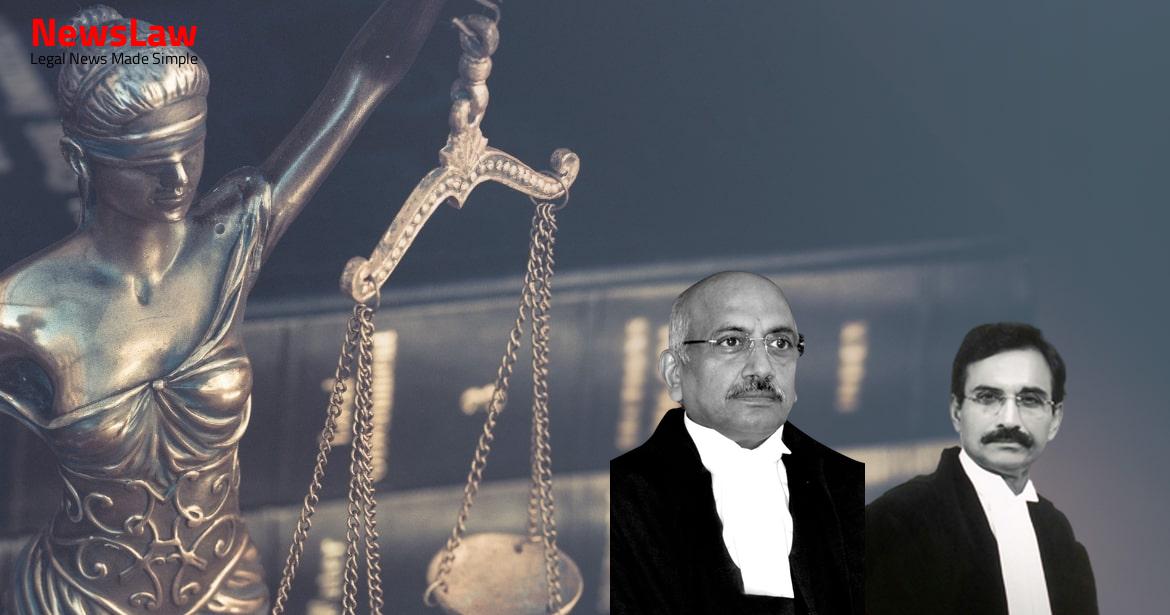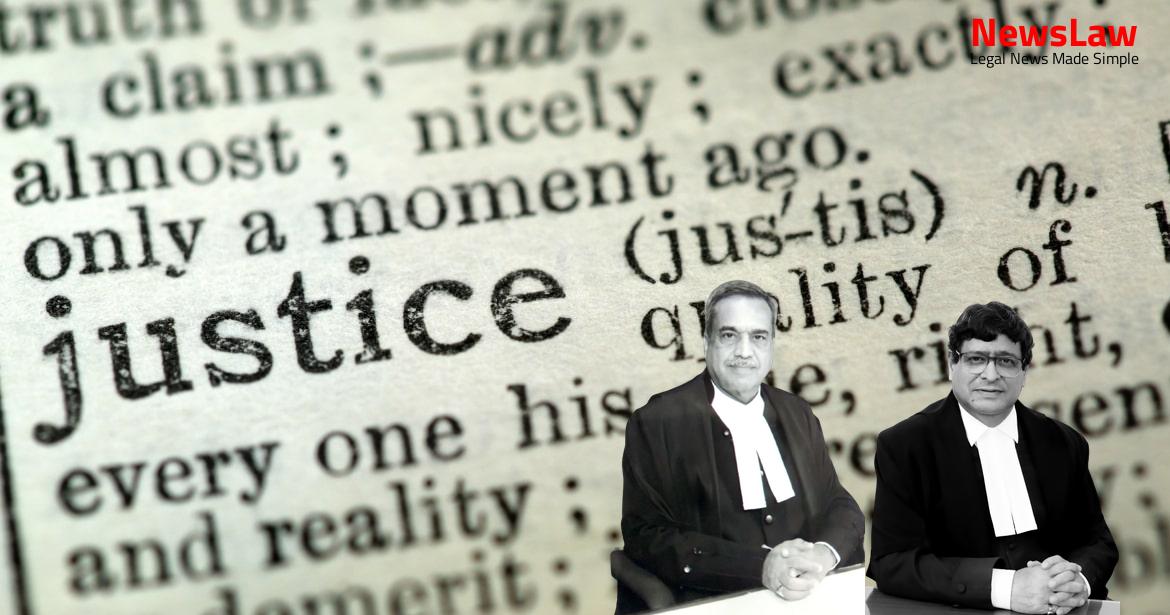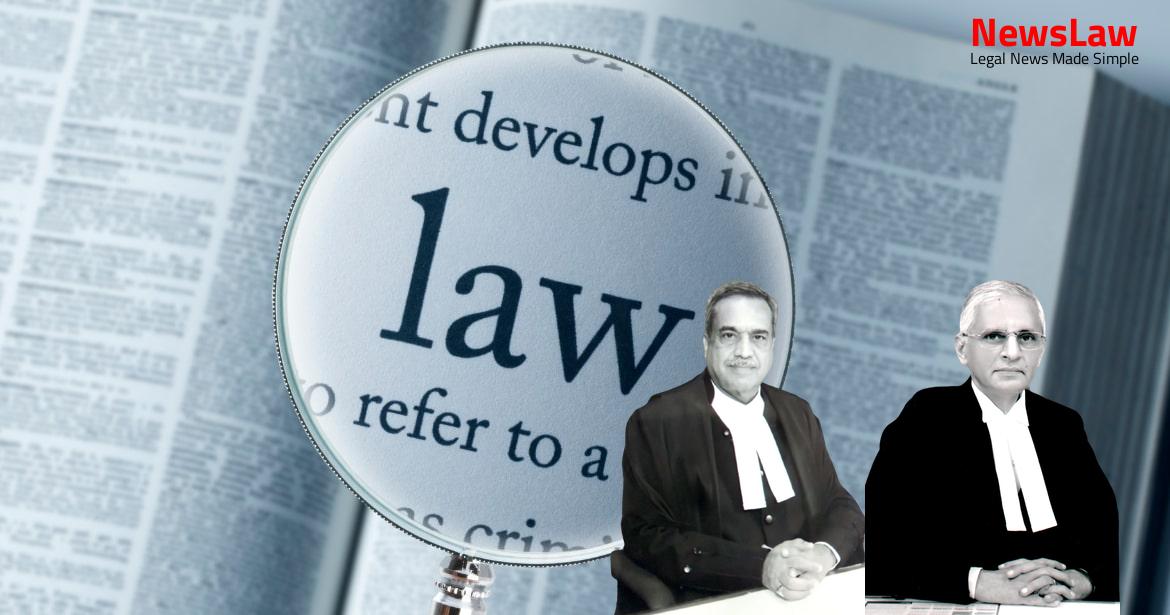Explore a detailed legal analysis of a case involving the evolution of a limited estate to absolute ownership rights under the Hindu Succession Act. The court’s thorough examination of Sections 14(1) and 14(2) in determining property rights sheds light on the complexities of inheritance laws. Stay tuned to unravel the nuances of this legal dispute and its implications on property ownership rights.
Facts
- The consequences of a testamentary disposition by a Will dated 15.4.1968 by Tulsi Ram are pending resolution after fifty years.
- The Will bequeathed the estate to Tulsi Ram’s son, the appellant, and his second wife Ram Devi.
- A series of litigations ensued, with appeals and judgments against Ram Devi’s limited estate.
- The suit was deemed collusive in nature, and subsequent appeals and judgments had varied outcomes.
- Ram Devi’s right over the property under the Will was contested, leading to further litigation.
- The property was to vest absolutely in the appellant after Ram Devi’s lifetime.
- Challenges were raised against sale deeds, declarations, and injunctions in multiple suits.
- The issue of limited versus absolute estate ownership rights was a key contention during the litigations.
- The doctrine of res judicata was debated, with claims of bona fide purchasers for value under the TP Act.
- The previous decree in favor of the appellant was upheld as binding among the parties and their successors-in-interest.
- Various transactions and deeds surrounding the property were scrutinized in the legal proceedings.
- The court noted that the title of the purchasers could not be better titled than Ram Devi as they acquired their rights from her.
- The purchasers were not considered bona fide purchasers for value due to the history of the litigation.
- The judgement on the Will executed by Tulsi Ram fell under Section 14(2) of the Hindu Succession Act, 1956, precluding benefits of Section 14(1) in cases of properties inherited with restricted rights.
- The suit was decreed in favor of the appellant in 1995 and reaffirmed in 2009.
- The civil judge’s decision was based on the limited ownership rights of Ram Devi, preventing her from alienating the suit property.
- Consistent opinion on the construction of Sections14(1) and 14(2) was crucial to uphold the right of Hindus to execute Wills as per Section 30 of the said Act.
- Decree of possession was granted to the appellant as the rightful owner of the property.
Also Read: Supreme Court Judgment on Single Till Mechanism for HRAB Calculation: A Comprehensive Analysis
Issue
- The specific issue in the judgment pertains to whether Ram Devi’s limited right over the suit property conferred through the Will had evolved into an absolute right under Section 14(1) of the relevant Act.
- The two main considerations in this issue are: (i) Whether Ram Devi became the absolute owner of the property as per Section 14(1) or if the Explanation under Section 14(2) of the Act would apply, (ii) The impact of the previous litigation between the appellant and Ram Devi, who were beneficiaries of the Will.
- The analysis in the judgement focuses on three main points: (a) Whether the first litigation constitutes res judicata for the current appeal, (b) Whether the High Court was required to frame a substantial legal question in deciding the second appeal.
Arguments
- Appellant’s counsel argues that the life estate given to Ram Devi was not in recognition of any pre-existing right or maintenance.
- Section 14(2) of the Act should apply, not Section 14(1) according to the appellant’s counsel.
- Respondent argued that the factual scenario of the case resembled the ‘Shakuntla Devi’ case, emphasizing the rights of a female Hindu post the Hindu Succession Act.
- Cited the case of ‘V. Tulasamma & Ors.’ to support the argument that the female Hindu was an absolute owner and entitled to sell the land.
- Asserted that the respondents were bona fide buyers protected by Section 41 of the Transfer of Property Act.
Also Read: Selection and Appointment of Judicial Officers in Himachal Pradesh
Analysis
- The judgment in V. Tulasamma & Ors. case was not retrospective but a declaratory decree simpliciter would not attain finality if used in a future decree of possession.
- A defendant in a future suit for possession can establish that the earlier declaratory decree was not lawful.
- The High Court was not required to frame a substantial question of law while deciding the plea as Section 97(1) of the Code of Civil Procedure, 1908 would not be applicable to the PC Act.
- The High Court held that the V. Tulasamma & Ors. case had resolved uncertainties under Sections 14(1) & 14(2) of the said Act.
- The subsequent judgment in Jupudy Pardha Sarathy v. Pentapati Rama Krishna & Ors. was referenced to support the resolution of uncertainties.
- A Hindu female has a right to maintenance on a property if a charge was created for her maintenance.
- The claim for maintenance is a pre-existing right, so any transfer declaring such right only confirms pre-existing rights.
- Section 14(2) of the Act does not dilute Sections 14(1) and 14(2) when there is a pre-existing right.
- Section 14(2) only applies when an instrument creates a new title for the wife for the first time.
- A limited estate given to a wife for maintenance matures into an absolute estate under Section 14(1) of the Act.
- If a restricted estate is given to a female in lieu of maintenance or at a partition, Section 14(1) operates, not Section 14(2).
- The husband has a personal obligation to maintain his wife, and her right to maintenance is an equitable charge on his property.
- The wife’s right to maintenance is not a right to property but a pre-existing right in property.
- The intention of the Parliament in adding categories to Section 14(2) was to ensure new or independent titles for Hindu females.
- The possession of a widow must have some vestige of a claim, right, or title to be deemed possessed for the purposes of Section 14(1).
- Section 14 of the said Act gives property rights to Hindu females.
- Sub-section (1) of Section 14 specifies that it applies to properties acquired before or after the commencement of the Act, and the female Hindu shall hold the property as a full owner.
- The Explanation to sub-section (1) defines ‘property’ in a broad sense, including various forms of acquisition like inheritance, gift, skill, etc.
- Sub-section (2) of Section 14 acts as a proviso, stating that certain types of property acquisitions are not covered by sub-section (1).
- The rights of the respondents are derived only from Ram Devi.
- Judgment is binding on Ram Devi, and she cannot create rights contrary to the judgment in favor of third parties.
- The transactions in question are not bona fide but dubious in character.
- The repeated endeavors of Ram Devi and her daughter to deny the appellant rights conferred under the Will to third parties are not permissible.
- The appeals are allowed, setting aside the impugned judgment of the High Court.
- The decree of the trial court dated 13.8.2009 is reaffirmed.
- The High Court incorrectly proceeded on the basis that the first round of litigation would not create any binding precedents due to a change in law after the first round of litigation.
Decision
- Each party will bear their own costs
- There will be no cost order made by the court
Case Title: JOGI RAM Vs. SURESH KUMAR (2022 INSC 131)
Case Number: C.A. No.-001543-001544 / 2019



